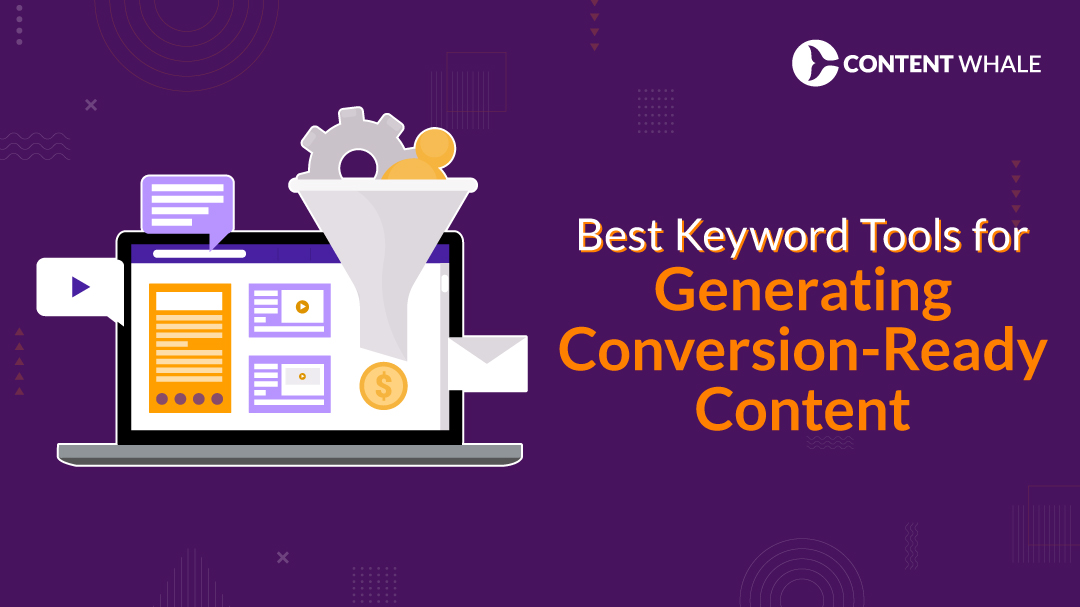Targeting the right keywords is crucial for content that drives conversions. Choosing the best keyword tools for generating conversion-ready content can attract traffic and turn visitors into customers.
Conversion-focused content needs keywords that not only match user intent but also guide users towards taking action, whether it’s signing up for a service or making a purchase.
Keyword research tools are essential in uncovering the buyer intent keywords that align with your target audience’s needs.
Whether you’re looking to optimize for long-tail keywords or analyze keyword difficulty, the right tools can make all the difference.
This post will explore some of the best keyword tools available today, from Google Keyword Planner to Ahrefs and Moz Keyword Explorer, to help you generate content that converts more efficiently.
1. Why Keywords Matter for Conversion-Ready Content
Understanding why keywords are essential for conversion-ready content can make a significant difference in your marketing efforts. Here are a few key reasons:
A) Aligns Content with User Intent
Using high-conversion keywords ensures that your content matches the specific needs of users who are ready to act. Instead of just targeting general search terms, these keywords reflect the intent of potential customers—those who are further along in the buyer’s journey and more likely to convert.
B) Targets Action-Oriented Users
Some keywords, like “buy now,” “best price for,” or “discount on,” indicate buyer intent. These action-driven keywords often bring in fewer visitors but result in higher conversions since the users are already interested in making a purchase.
C) Guides Users Through the Sales Funnel
When you integrate conversion-optimized keywords with long-tail keywords, your content naturally leads users through different stages of the funnel—from TOFU (Top of Funnel) awareness to BOFU (Bottom of Funnel) decision-making. This strategic approach helps to push visitors closer to taking action.
2. Top 5 Keyword Tools for Finding Conversion-Optimized Keywords
Finding the right tools can make keyword research more efficient, especially when focusing on high-converting keywords. Here are five of the best tools for this purpose:
A) Google Keyword Planner
- Best For: Finding buyer intent keywords.
- Key Features: Provides search volume, cost-per-click (CPC), and competition data. You can easily identify high-converting long-tail keywords that indicate user intent.
- Why It’s Great: It’s free, easy to use, and integrates well with Google Ads for campaign optimization.
B) SEMrush
- Best For: Advanced keyword analysis.
- Key Features: Offers in-depth analysis of keyword difficulty, competitive research, and organic search performance. The Keyword Magic Tool helps you discover conversion-optimized keywords that your competitors might be missing.
- Why It’s Great: Its database covers over 25 billion keywords, offering insights on buyer intent and search trends.
C) Ahrefs
- Best For: SERP analysis and content gap identification.
- Key Features: Provides detailed SERP analysis, showing how keywords rank and how much traffic they generate. It also helps you uncover content gaps for targeting untapped high-converting keywords.
- Why It’s Great: Its robust keyword tracking and analysis make it ideal for ongoing optimization.
D) Ubersuggest
- Best For: Long-tail keyword suggestions.
- Key Features: An affordable tool that offers competitive analysis and keyword suggestions. It’s particularly strong in identifying long-tail keywords that can drive conversions.
- Why It’s Great: Excellent for small businesses due to its low pricing and easy-to-use interface.
E) Moz Keyword Explorer
- Best For: Keyword suggestions and search volume insights.
- Key Features: Delivers related keyword suggestions with metrics on search volume and organic CTR. The Priority Score helps prioritize high-converting keywords based on a mix of factors.
- Why It’s Great: Simple to use and ideal for identifying keywords with conversion potential.
3. How to Use These Tools to Generate High-Converting Content
Once you have the right keyword tools at your disposal, knowing how to use them effectively is key to creating content that converts. Here’s how:
A) Identify Buyer Intent Keywords
- Start by focusing on keywords that indicate high purchasing intent, such as “buy,” “best,” “discount,” or “deal on.”
- Use tools like Google Keyword Planner or SEMrush to discover these high-value terms.
- Prioritize those with high search volume but lower competition.
B) Leverage Long-Tail Keywords
- Long-tail keywords might have lower search volume but often lead to higher conversions.
- Tools like Ubersuggest and Ahrefs excel in identifying these opportunities.
- Combine long-tail keywords with your primary keywords to maximize impact.
C) Prioritize Content Creation
Look for keywords with lower keyword difficulty and high relevance to your target audience. This allows you to create content that can rank well and convert users more efficiently. Use tools like Moz Keyword Explorer to assess the difficulty and volume balance.
D) Map Keywords to Buyer’s Journey
Ensure your keywords align with different stages of the buyer’s journey. For example:
- TOFU (Top of Funnel): Focus on awareness-related keywords.
- MOFU (Middle of Funnel): Use keywords related to product comparisons or reviews.
- BOFU (Bottom of Funnel): Target purchase-intent keywords like “best deals” or “buy now.”
4. SEO Tool Comparison: Which is Best for Conversion-Ready Content?
When choosing the best keyword tools for creating conversion-ready content, it’s essential to compare their features, pricing, and usability. Here’s a breakdown of the top tools to help you make an informed decision:
A) Google Keyword Planner
- Features: Free tool with keyword suggestions based on search volume, competition, and cost-per-click data.
- Best For: Small businesses or startups looking for a budget-friendly option.
- Drawback: Lacks advanced features like SERP analysis and detailed competitor research.
B) SEMrush
- Features: Offers robust competitor research, keyword difficulty scores, and the Keyword Magic Tool for discovering buyer intent keywords.
- Best For: Advanced users looking for a comprehensive SEO suite.
- Pricing: Starts at $119.95 per month, making it suitable for larger businesses or SEO professionals.
C) Ahrefs
- Features: Known for detailed SERP analysis, backlink monitoring, and keyword tracking. It’s ideal for finding content gaps and identifying high-converting keywords.
- Best For: Businesses focused on SERP rankings and ongoing keyword performance.
- Pricing: Starts at $99 per month, offering a more affordable option for mid-size companies.
D) Ubersuggest
- Features: Provides long-tail keyword suggestions, competitive analysis, and keyword tracking.
- Best For: Beginners or small businesses due to its low pricing.
- Pricing: Starts at $29 per month, making it one of the most affordable options.
E) Moz Keyword Explorer
- Features: Offers keyword suggestions, search volume insights, and a Priority Score to focus on the most valuable keywords.
- Best For: Users who need straightforward keyword suggestions without the complexity of advanced tools.
- Pricing: Starts at $99 per month, but its simplicity makes it ideal for small businesses.
5. Tips for Conducting Conversion-Focused Keyword Research
Finding the right conversion-focused keywords requires a strategic approach. Here are some practical tips to guide your keyword research:
A) Focus on Buyer Intent Keywords
- Look for keywords that indicate users are ready to make a purchase, such as “buy,” “best,” “top-rated,” or “discount.”
- These keywords signal strong buyer intent, leading to higher conversion rates. Tools like Google Keyword Planner and SEMrush can help you pinpoint these terms.
B) Use Long-Tail Keywords for Specific Conversions
- Long-tail keywords tend to have lower search volume but can be highly effective for conversions.
- Keywords like “best running shoes for women” or “affordable digital cameras under $500” target specific user needs, making them more likely to convert. Ubersuggest is great for uncovering these high-converting keywords.
C) Prioritize Keywords with High Search Intent
- Distinguish between informational and transactional keywords. Transactional keywords, like “order,” “buy,” or “best deals,” should be prioritized for content targeting bottom-of-funnel (BOFU) leads who are ready to purchase.
D) Build Content Clusters Around Conversion Keywords
- Create content clusters around high-converting keywords by developing related blog posts, guides, or product pages.
- This will help improve your content’s visibility on search engines while engaging potential customers at different stages of the buying process.
| # | Tips | Description | Benefits |
| 1 | Focus on Buyer Intent Keywords | Identify keywords that show users are ready to purchase (e.g., “buy now,” “best price for”). | Drives high-quality traffic with a higher likelihood of conversions. |
| 2 | Use Long-Tail Keywords | Target specific, low-competition keywords that address detailed queries. | Improves chances of ranking and attracts niche audiences ready to convert. |
| 3 | Analyze Search Intent | Differentiate between informational and transactional keywords to align with user expectations. | Ensures your content meets the user’s needs, improving conversion rates. |
| 4 | Leverage Seasonal and Trending Keywords | Incorporate trending or seasonal keywords relevant to your product or service. | Increases visibility during peak times, attracting more conversion-ready users. |
| 5 | Monitor Competitor Keywords | Use tools to analyze what high-converting keywords competitors are ranking for. | Identifies gaps in your strategy and provides opportunities to outperform competitors. |
| 6 | Check Keyword Difficulty | Focus on keywords with manageable competition levels, especially if your domain authority is lower. | Helps you choose achievable targets for higher rankings and conversions. |
| 7 | Track and Test Keyword Performance | Continuously monitor keyword performance and run A/B tests on keywords for optimization. | Improves overall strategy by identifying which keywords drive the most conversions. |
6. Tracking Keyword Performance for Continuous Optimization
Once you’ve implemented your conversion-ready keywords, it’s essential to track their performance to continuously improve your content’s impact. Here are some actionable steps:
A) Use Analytics Tools to Track Keyword Rankings
- Platforms like Google Analytics and Ahrefs are excellent for monitoring how well your keywords are ranking.
- Regularly check the positions of your high-converting keywords and adjust your strategy as needed.
B) Focus on Click-Through Rates (CTR)
- A high CTR indicates that your SEO meta tags and keywords are effectively engaging users.
- Analyze which keywords are generating clicks and which aren’t. Google Search Console is a useful tool for this analysis.
C) Measure Conversion Metrics
- Ultimately, the success of your conversion-focused content lies in its ability to drive actions.
- Keep an eye on metrics like form submissions, product purchases, or sign-ups to gauge the effectiveness of your high-converting keywords.
- Tools like SEMrush and Google Analytics provide detailed conversion tracking options.
D) Update Content Regularly
- Revisit your content every few months to ensure that your keywords are still relevant and aligned with user intent.
- Ahrefs helps identify keywords that may be losing rank so you can refresh your content for better performance.
Conclusion
Choosing the right keyword tools is essential for generating conversion-ready content that drives results. From free options like Google Keyword Planner to advanced tools like SEMrush and Ahrefs, the right choice depends on your business needs and budget.
By focusing on buyer intent keywords, long-tail keywords, and regularly tracking your keyword performance, you can improve both traffic and conversions. These strategies will help you create content that not only attracts visitors but also converts them into loyal customers.
At Content Whale, we specialize in creating high-quality, SEO-focused content that drives conversions and boosts search visibility. With extensive expertise in keyword research and content optimization, we ensure that your content is aligned with the latest conversion-ready keyword strategies. Whether you need blogs, product descriptions, or web content, we have the tools and expertise to deliver.
Let us help you craft the perfect conversion-focused content and let’s optimize your content strategy for success!
FAQs
1. What are the best free keyword tools for finding conversion-ready keywords?
Google Keyword Planner is an excellent free tool for discovering conversion-ready keywords. It provides data on search volume and competition for keywords with high buyer intent. Ubersuggest also offers a free version, which is useful for finding long-tail keywords with strong conversion potential.
2. How do I use keyword tools to find buyer intent keywords?
Start by entering transactional terms like “buy,” “best price,” or “discount” into tools such as SEMrush or Ahrefs. These tools will provide data on search volume, keyword difficulty, and potential buyer intent keywords. Prioritize those with high relevance to your product or service.
3. What’s the difference between high-conversion keywords and high-traffic keywords?
High-traffic keywords attract a large volume of visitors, but they may not necessarily lead to conversions. High-conversion keywords, on the other hand, may have lower search volume but are more likely to drive specific actions, like purchases or sign-ups, as they target users closer to the decision-making stage.
4. How can I track the performance of conversion-focused keywords?
You can use tools like Google Analytics and Ahrefs to monitor keyword rankings, CTR (click-through rates), and conversion metrics. Regularly check these metrics to adjust your strategy as needed.
5. Which keyword tool is best for small businesses?
For small businesses, Ubersuggest and Google Keyword Planner are excellent options due to their affordability and ease of use. These tools provide valuable insights into long-tail keywords and help optimize content for better conversions without breaking the budget.





